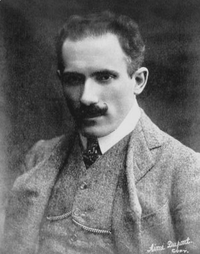Arturo Toscanini
Arturo Toscanini (Parma, Kingdom of Italy, March 25, 1867 - New York, United States, January 16, 1957) was an Italian conductor, considered by many of his contemporaries (critics, colleagues and the general public) and by many current critics as the greatest conductor of his time and of the 20th century. He was renowned for his brilliant intensity, his relentless perfectionism, his prodigious hearing, and his photographic memory, which enabled him to correct mistakes by orchestra members that had gone unnoticed for decades by his colleagues.
Biography
Toscanini began his musical training in Parma by winning a scholarship to the local conservatory, where he studied cello. After his studies, he was admitted to the orchestra of an opera company with which he toured South America. While they were performing Aida in Rio de Janeiro in 1886, the orchestra's director was booed by the audience and forced to leave the stage. Toscanini, fortunately, took the baton encouraged by the rest of the musicians, thus beginning, at the age of 19, his career as a conductor.
In 1898, he was appointed resident director of La Scala in Milan, where he stayed until 1908. During that time he premiered works by contemporary authors, among others, the oratorio Mosè by Lorenzo Perosi, whose first performance it took place in May 1901 at the Salone Perosi in Milan. After this first period at La Scala he went to the United States to conduct at the Metropolitan Opera in New York (1908-15). Later, he would return to La Scala in the 1920s. He played at the Bayreuth Festival (1930-31) and at the Salzburg Festival (1934-37). Between 1926 and 1936 he conducted the New York Philharmonic Orchestra.
Radically opposed to the fascist regimes in Germany and Italy, he left Europe for the United States. There the NBC Symphony Orchestra was founded for him in 1937, and with it he performed regularly until 1954 on National Radio. His performances made him the first star conductor of the modern mass media. His activity as director of live performances for radio continued until his retirement.
Toscanini was famous for his interpretations of Beethoven and Verdi. He made numerous recordings, especially towards the end of his career, most of them published, in addition to the numerous recordings of his performances available for radio.
Toscanini in Argentina
At the beginning of the XX century, Toscanini was already conducting operas in Buenos Aires. In 1912 he was in charge of directing the entire opera season at the Teatro Colón. He returned in 1940 with the NBC orchestra and in 1941 to conduct a series of concerts with the Orquesta Estable del Teatro Colón.
In Argentina, the cult of Arturo Toscanini has existed since the beginning of the XX century. For the first time in the world, on Radio Nacional FM, more than 300 programs of one hour each were broadcast, with all the commercial legacy of the Maestro, containing approximately 90 percent of the unofficial live records, except for two or three which has been almost impossible to reconstruct, and dozens of hours of rehearsals.
The musicologist Claudio von Foerster (who was related to Walter Toscanini and Wanda Horowitz) studied and disseminated the figure of Toscanini.
Discography
For most of the compilations of his work, his best recordings are as follows:
- Beethoven, Symphony No. 3 (1953, NBC Symphony; some prefer the recording of 1939).
- Beethoven, Symphony No. 7 (1936, Philharmonic-Symphony of New York)
- Beethoven, Symphony 9 (1952, NBC Symphony)
- Berlioz, Romeo and Juliet (1947, NBC Symphony)
- Brahms, Symphony No. 1 (1951, NBC Symphony)
- Brahms, Symphony No. 2 (1952, NBC Symphony)
- Brahms, Symphony No. 4 (1951, NBC Symphony)
- Debussy, The Mer (1950, NBC Symphony)
- Dvořák, Symphony, No. 9 (1953, NBC Symphony)
- Haydn, The Stations (Die Jahreszeiten) (1951, NBC Symphony)
- Mozart, The magic flute (1937, Salzburg Festival; poor sound quality)
- Mozart, Requiem in minor, K. 626 (1950, NBC Symphony)
- Puccini, La bohème (1946, NBC Symphony)
- Schubert, Symphony 9 (1953, NBC Symphony; some prefer the 1941 recording, Philadelphia Orchestra)
- Verdi, Requiem (1940, NBC Symphony; better sound in the 1951 recording, NBC)
- Verdi, Falstaff'' (1937, Salzburg Festival; best sound in the 1950 recording, NBC)
- Verdi, OTHER (1947, NBC Symphony; considered by many as the most perfect recording of an opera ever performed)
- Wagner, Nuremberg Masters (1937, Salzburg Festival; poor sound quality)
Contenido relacionado
Stephen VII
Enrique Iglesias
Theodore Gericault


